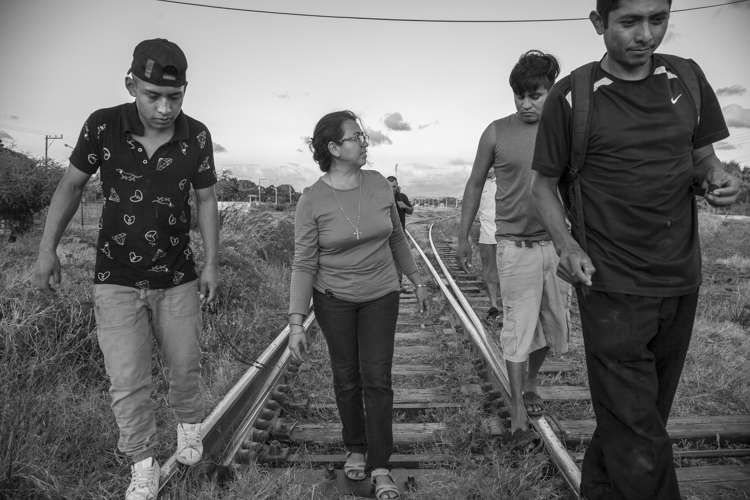
Guardian Angel Sr. Eligia Ayala Molina, center, walks with migrants around the neighboring train tracks. (Lisa Kristine)
Guardian Angel Sr. Lorena Hernández Jiménez still remembers one of her first cases as the refugee office coordinator at the shelter on the Mexico-Guatemala border.
Two siblings, ages 26 and 34, passed through the refugee shelter that five Guardian Angel sisters oversee in Ixtepec, Mexico. The young women were escaping extortion from gangs in El Salvador. Hernández was helping them process their request for asylum, which included seeing the photos they'd taken after gang members beat them up.
It began with extortion: A local gang demanded the sisters pay them $50 a week. When the younger sister said she didn't have enough to pay, the men took her upstairs.
"They completely destroyed her, getting her naked and hitting her 15 times with a baseball bat on the back," Hernández said.
Later, the same happened to her sister. When the gang found out the sisters had reported them to the police, they began threatening their children.
But at the shelter, they had a strong case for asylum, with photos of their injuries as evidence and the ongoing threats to their family.
For many migrants heading north from Central America, particularly those seeking asylum, the sisters' shelter on the border is a crucial pit stop.
At the Albergue Hermanos en el Camino (Shelter for Brothers on the Road), migrants who are eligible to apply for asylum can stay for months; others stay a few nights, using the shelter's resources to tend to injuries, use the computer lab, make calls, get a haircut and new clothes, and have a few meals.
But to the sisters, the shelter is more than a center for resources or a bed for the night. It's an opportunity to prevent trafficking and identify those who may have experienced it on their route, as migrants are particularly vulnerable to exploitation.




